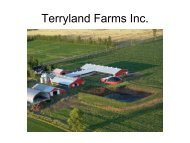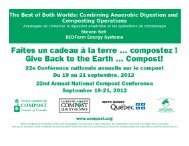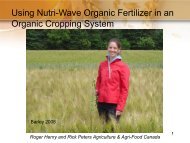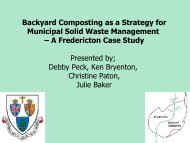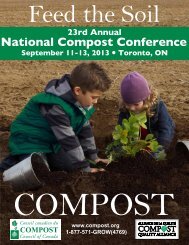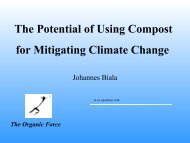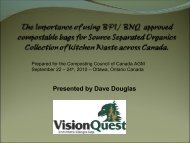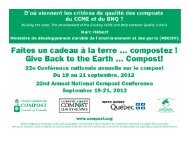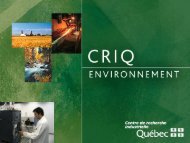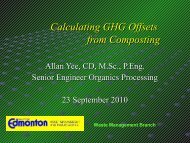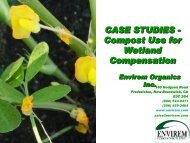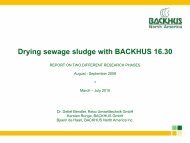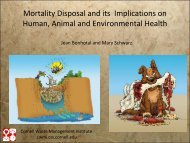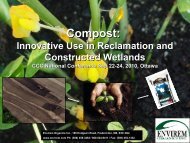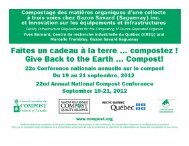Steve Mojo, Biodegradable Products Institute (BPI) - Compost ...
Steve Mojo, Biodegradable Products Institute (BPI) - Compost ...
Steve Mojo, Biodegradable Products Institute (BPI) - Compost ...
Create successful ePaper yourself
Turn your PDF publications into a flip-book with our unique Google optimized e-Paper software.
Latest Developments for<br />
<strong>Compost</strong>able <strong>Products</strong><br />
&<br />
Labeling Challenges<br />
<strong>Steve</strong> <strong>Mojo</strong>-<strong>BPI</strong> Exec. Director<br />
CCC Conference<br />
September, 2012
Agenda<br />
• Latest Developments<br />
– NSF/<strong>BPI</strong> Partnership<br />
– <strong>Compost</strong>able Bag Growth<br />
– Labeling
<strong>Compost</strong>able Logo Background<br />
• In 2002, the <strong>Compost</strong>able Logo<br />
created<br />
• <strong>Products</strong> meet ASTM or BNQ<br />
requirements<br />
• Testing done in approved 3 rd party labs<br />
• Results reviewed by independent<br />
experts<br />
• Licensing agreement with <strong>BPI</strong> for<br />
right to use the Logo.
Background<br />
• Today, the <strong>Compost</strong>able Logo<br />
–140+ Companies<br />
– 2,500+ <strong>Products</strong><br />
– <strong>Products</strong> from US, Europe<br />
and Asia<br />
• Program success mandated<br />
finding a partner to help<br />
administer this effort
<strong>BPI</strong>-NSF Int. Partnership<br />
• January, 2012 created a partnership with<br />
NSF International<br />
• NSF is a leading global certifier in many<br />
categories, including wastewater and<br />
food safety.<br />
• Offices in Montreal and Guelph<br />
• NSF responsible for reviewing data from<br />
approved 3 rd party labs for compliance to<br />
ASTM Specifications<br />
• The <strong>BPI</strong> will continue to license the<br />
“<strong>Compost</strong>able Logo” after NSF approval
Benefits<br />
• The “<strong>Compost</strong>able Logo” will not be<br />
changed.<br />
• Program is now ISO Guide 65 Compliant<br />
• Global standard for 3 rd party certifications<br />
• Increased credibility<br />
• The <strong>BPI</strong> website will continue to list approved<br />
products.
Certified <strong>Compost</strong>able<br />
Bags
Certified <strong>Compost</strong>able Bags<br />
• <strong>Compost</strong>able bags are<br />
cornerstone of many<br />
programs.<br />
• Reduce mess and<br />
odors.<br />
• Improve program<br />
participation.<br />
• Used by communities<br />
across Canada
4.3 Million Canadian Households Using<br />
Certified <strong>Compost</strong>able Bags<br />
Population<br />
(Millions)<br />
History of SSO Kitchen Organic<br />
Collection Programs<br />
9<br />
8<br />
7<br />
6<br />
5<br />
4<br />
3<br />
2<br />
Total<br />
Nanaimo, BC allowing compostable<br />
bags.<br />
Hamilton, Niagara, Barrie allowing the<br />
use of certified compostable bags for<br />
collection after being paper bags only.<br />
York Region phasing out plastic bags -<br />
moving to certified compostable bags<br />
2011.<br />
NO <strong>Compost</strong>able Plastic<br />
YES <strong>Compost</strong>able Plastic<br />
1<br />
0<br />
1997 1998 1999 2000 2001 2002 2003 2004 2005 2006 2007 2008 2009 2010<br />
Source: W Ralston (Canada) Inc.
Education is<br />
Key<br />
Durham, ON<br />
Peel, ON
Labeling<br />
<strong>Compost</strong>able <strong>Products</strong>
<strong>Compost</strong>able, <strong>Biodegradable</strong><br />
or Not?
Advances in <strong>Compost</strong>ables<br />
• Dramatic growth in past<br />
decade<br />
• Paper coatings<br />
• Improved barrier properties<br />
• New multi-layer<br />
constructions<br />
• Foams<br />
• Even harder to distinquish<br />
vs. non-compostables
<strong>BPI</strong> Labeling Guidelines<br />
• “<strong>Compost</strong>able in Municipal Programs,<br />
where Approved”<br />
– <strong>Products</strong> must meet ASTM D6400 or<br />
D6868<br />
– Claims should be qualified.<br />
• “<strong>Compost</strong>able, where approved”<br />
– <strong>Products</strong> themselves should be labeled<br />
“<strong>Compost</strong>able”<br />
• Graphics or <strong>BPI</strong> Logo<br />
• Colors (green or brown, preferable)<br />
– <strong>Products</strong> should be certified by<br />
independent 3 rd party.
US State Regulations<br />
• California and Minnesota have<br />
regulations linking the term<br />
“<strong>Compost</strong>able” to ASTM D6400<br />
and D6868.<br />
• California regulates the use of<br />
“biodegradable” on plastic<br />
bags.
“<strong>Biodegradable</strong>”<br />
&<br />
“Biobased”<br />
&<br />
“BioPlastic”<br />
≠<br />
“<strong>Compost</strong>able”
Examples to avoid<br />
• Labeled as “biodegradable”,<br />
“made with renewable materials” ,<br />
“made with corn”<br />
• Made with traditional nonbiodegradable<br />
resins, despite<br />
names or claims.<br />
• Product #1: 41% PP, 51% Starch<br />
• Product #2: 57% PP, 30%<br />
Starch<br />
• Product #3: 50% PP, 47%<br />
Starch
Biobased is NOT <strong>Compost</strong>able
“Biobased” Cutlery<br />
Polypropylene
If you are a composter,<br />
only accept “compostable”<br />
items
<strong>BPI</strong> Contact Information<br />
• Tel: (01) 888-274-5646<br />
• Fax: (01) 508-858-0608<br />
• Email:<br />
– info@bpiworld.org<br />
• Website:<br />
– www.bpiworld.org



